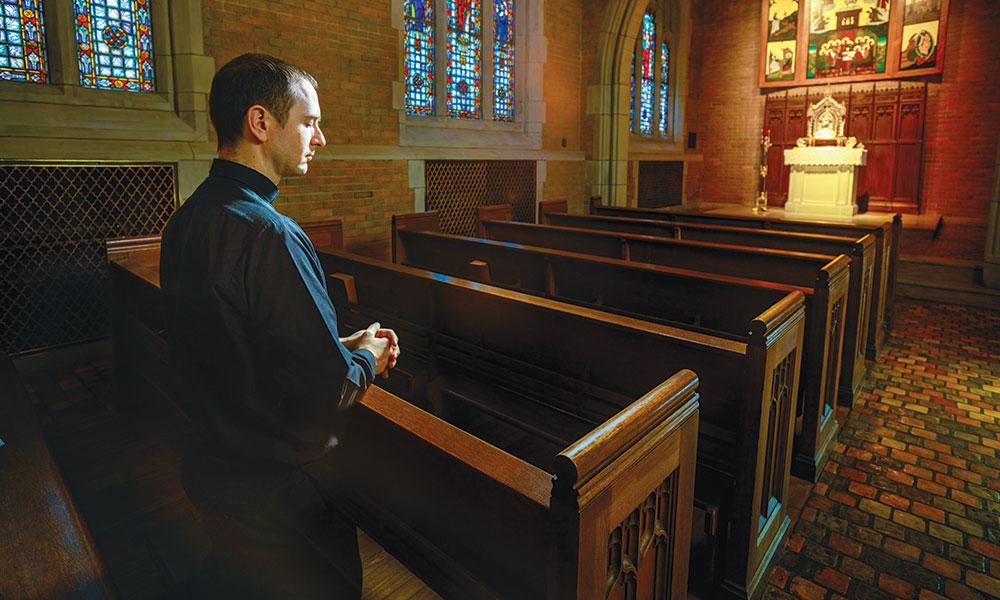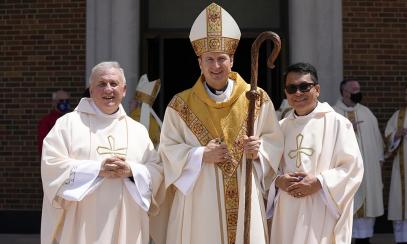
A Healthy Parish is Led by Priests Striving for Health and Holiness
THANK YOU TO ALL who have participated in the Realign Resources for Mission (RRM) parish meetings so far. It has been a great privilege to meet with you, pray with you and discuss with you how, together, we can ensure every parish in our diocese is fit for mission in the 21st century.
What is the mission of every parish? It is that divine mandate given by Jesus Christ himself: “Go therefore and make disciples of all nations, baptizing them in the name of the Father and of the Son and of the Holy Spirit.” (Mt 28:19) And why is that important? Because, as Bishop Boyea proposes to us: “In the person of Jesus Christ, we introduce our family and friends to the deepest happiness, meaning and peace that this life can offer. We also help them get to heaven in the next. Our earthly existence has no greater purpose.”
Hence, the importance of our recent parish meetings. It is your feedback that will inform the next step for the RRM process as we begin drawing up a range of concrete proposals. These proposals will come back to you for further comment next year before going to Bishop Boyea after Easter 2021.
From the feedback received already, it seems that when faced with the stark statistical realities charting decline in our parishes in recent decades, most of us are convinced that some form of restructuring has to occur, that “something must be done.” As articulated at each parish meeting, Bishop Boyea has now put forth a vision what that “something” should look like. He proposes that a healthy parish within the Diocese of Lansing is one that is: led by priests who are striving for health and holiness; equips and empowers parish staff; makes and forms missionary disciples; and seeks the lost and serves the poor.
This is a fourfold vision borne of many months of prayer and study. In the coming editions of FAITH magazine, I would like to explore and explain each of these four principles beginning this month with the first: “A healthy parish within the Diocese of Lansing is one that is: led by priests who are striving for health and holiness”. On this, I would like to say three things.
First, if we think that merely restructuring the diocese will bring different results, we're fooling ourselves. We need to change the culture and not just the structure of the parishes. In each parish there needs to be a culture which fosters and rewards and celebrates the very conditions that make evangelization possible. If we don't have the culture in place, we're never going to be able to get off the ground and move into a missionary mindset from parish to parish.
Second, creating that cultural change is ultimately a question of leadership, both the leadership of the individual pastor and the leadership of the bishop. As diocesan priests, we need to be unified with and accountable to our bishop. As any member of our presbyterate can testify to, not all priests have the capacity to lead a parish, and not all priests want to lead a parish. For some, that’s a question of training and, certainly, ongoing formation for priests has to become a much higher priority. For others, though, it is simply a question of having different gifts and talents – and that’s fine. When priests use the unique gifts that God has given them in their priestly apostolate, they are much more likely to see those gifts bear fruit, and that is when priests become most alive and most effective.
Third, parishes need multiple priests who also live in community. That could mean living in the same rectory or living in a way in which they share common life. That was the vision of priestly fraternity as initiated by Jesus Christ (Lk 10:1), and as affirmed by the Second Vatican Council (Presbyterorum Ordinis 7, 8). We priests cannot do what we are called to do on our own. We need to support each other so that we can prevent each other from falling into those traps that cause us to be lonely or vulnerable to the enemy. When priestly leadership fails, it is the laity who get discouraged, who feel lost and who often fall away or go somewhere else. Working together, we priests can better serve our laity in many ways, including an increased availability of the sacraments which help to foster an ever-deeper relationship with Jesus Christ.
Each parish needs priests who are pursuing holiness and who are led by a pastor who can create a happy and holy team of clerics and lay staff. This team, in turn, can foster communities of missionary disciples who are inspired and capable of bringing the person of Jesus Christ to a contemporary society in desperate need of his healing love. With the grace of God, together we can achieve this.
What is the mission of every parish? It is that divine mandate given by Jesus Christ himself: ‘Go therefore and make disciples of all nations, baptizing them in the name of the Father and of the Son and of the Holy Spirit.’”
(Mt 28:19)

